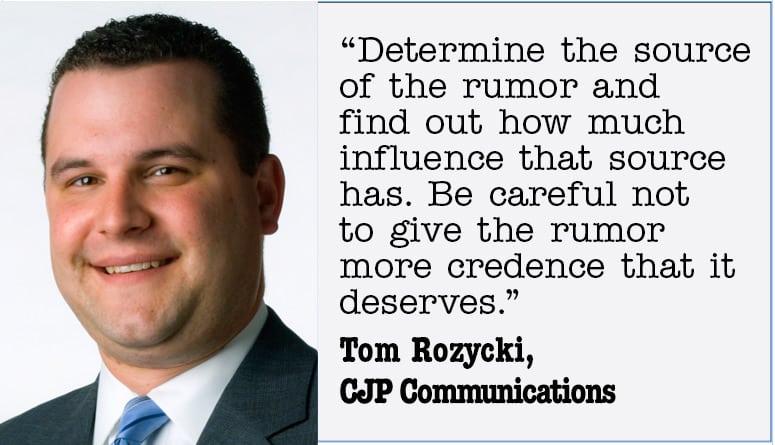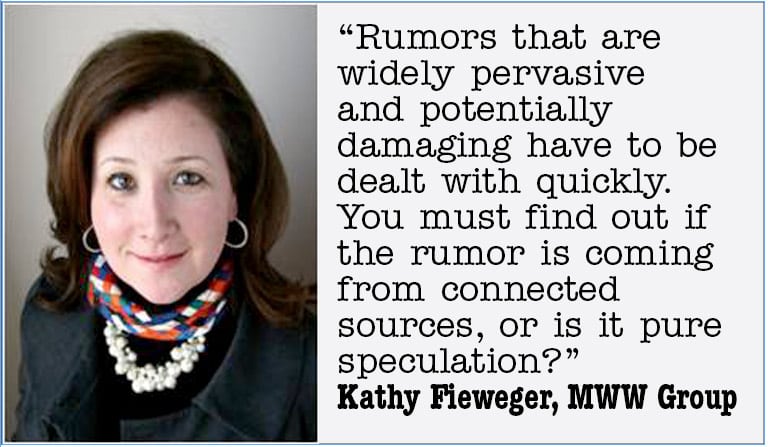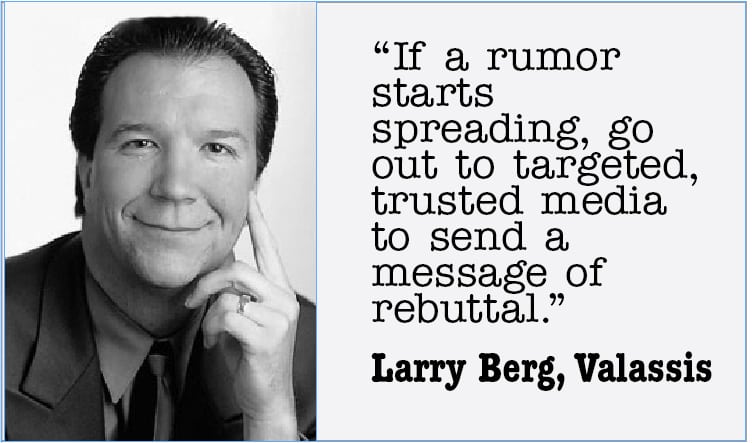Unfortunately for PR pros, rumors take on a life of their own. One minute it’s just a rumor, but as it spreads among stakeholders and the public, it often becomes the basis for fact—even when it isn’t fact at all.
Rumors can cause severe pain to organizations—financial and reputational. In October 2008, a rumor that Apple CEO Steve Jobs had suffered a serious heart attack caused $9 billion in market value loss. In late September of this year, Morgan Stanley CEO James Gorman went on the offensive to dispel a rumor that his company faced huge loses because of massive exposure to faltering European banks.
That’s the dilemma for communicators when dealing with rumors: When do you go on the offensive, and when do you back off?
 |
Tom Rozycki, senior VP at CJP Communications, based in New York, says it’s a tough judgment call. “You can go crazy running down every disparaging remark,” says Rozycki. “Then again, if a rumor has basis in fact, you must address it head on.”
One key barometer for whether to act quickly or not, says Rozycki, is to “determine the source of the rumor and find out how much influence that source has. Be careful not to give the rumor more credence that it deserves.”
 |
Figuring out the source of a rumor is important, says Kathy Fieweger, executive VP and general manager at MWW Group Midwest and national practice leader of the Enterprise Risk group. In one case, says Fieweger, a client faced rumors on Wall Street that their company was heading into restructuring. “In that case we had a reporter calling us about it,” so we decided to step back and do some research on the reporter.” The questions that must be asked: Is the rumor coming from connected sources, or is it pure speculation? In the end, MWW decided that the rumor wasn’t based on a well-placed source. “So we said we couldn’t comment on it.”
While some rumors may cause small ripples, they can turn into a swirling, giant storm, says Fieweger. “Rumors that are widely pervasive and potentially damaging have to be dealt with quickly,” she says. Meaning the CEO or another high-ranking exec should step out and quash the rumor.
 |
HAPPY APPROACH
Yet there are those who feel trying to rebut rumors is futile. Coca-Cola has been the subject of so many rumors that it has a Web page devoted to them. Click on the rumor—one is that if you read Coke’s Arabic logo backwards, it says “No Muhammad, No Mecca”—and you’ll get to the rebuttal.
But psychologists Derek Rucker and David Dubois of the Kellogg School of Management believe that this strategy only propagates the rumor. Instead, they suggest that organizations should put out a stream of positive news to counter the rumor.
Fieweger says she’s heard of this idea before. “Clients ask us why we just can’t put out a positive news release,” she says. But as a former journalist, Fieweger says “happy news” would be a hard sell to a veteran reporter who is following up on rumor.
MARKETPLACE MONITORING
What’s the best defense of a rumor? While people might think they pop up randomly, the best organizations constantly review the marketplace, assess where they stand with competitors, and prepare for potential issues that may rear up through rumors, says Larry Berg, VP of communications at Valassis, a media and marketing services company. “Best-in-class companies do regular reviews of their marketplace, to understand what’s happening and assess where they stand versus their competitors,” says Berg.
.jpg) |
RUMORS WITHIN
Then there’s the internal rumors. When it comes to propagating those among employees, it’s a management failure, says Jim Lukaszewski, president of The Lukaszewski Group, a crisis communications agency. “Rumors within are caused by instability, lack of focus or lack of change,” he says. For example, rumors may start to fly when, in a merger, management says, “This is the perfect combination of two great companies,” while in the trenches there is fear and doubt. “It’s management telling The Big Lie,” says Lukaszewski.
The antidote to squelching negative internal rumors? “Speedy, constructive communication that answers the questions being raised,” says Lukaszewski.
STRAIGHT TALK
Providing honest answers can also prevent rumors from spreading, as Rozycki experienced firsthand in late 2008-early 2009 when representing a client whose ship was hijacked by Somali pirates (see full case study in 1/25/2010 issue).
Preventing rumors from getting to or coming from the families of the 28 hostages was critical in the negotiation process to get the sailors released. At the outset, Rozycki asked the families not to comment. By day 40, however, understandably the families were getting restless.
Regular, transparent updates on the situation kept rumors from the mix, says Rozycki. “Honestly, we went for days without real news, and we could tell the families that their loved ones were ‘being treated well’ only so many times,” he says. But by keeping updates high-level and professional, rumors didn’t fly, which resulted in a happy ending.
To help ensure happy endings to rumors at your organization, Fieweger offers some advice:
1. Be aware of blips in your marketplace. Monitor all forms of media.
2. Prepare for four or five rumor scenarios. Draft key statements, and get legal involved in the process.
3. Figure out who your spokespeople will be. “This will depend on the severity of the rumor,” says Fieweger.
4. Be smart in determining whether the rumor is a small wave or a tsunami.
5. Respond proactively, and ensure you’re hitting the right media in the proper platform in response to the rumor.
6. Continue monitoring the marketplace for flare-ups once the rumor has subsided.
Of course, there are a few organizations, namely the aforementioned Apple, that thrive on rumors. “Apple loves rumors,” declares Rozycki. “In reporting about them, the tech media takes care of Apple’s marketing and PR.”
But that’s the exception, not the rumor rule. Just be as ready as you can for rumors, and you might just be able to avoid a dedicated rumor landing page a la Coke. PDF
CONTACT:
Tom Rozycki, [email protected]; Kathy Fieweger, [email protected]; Larry Berg, [email protected]; Jim Lukaszewski, [email protected].
